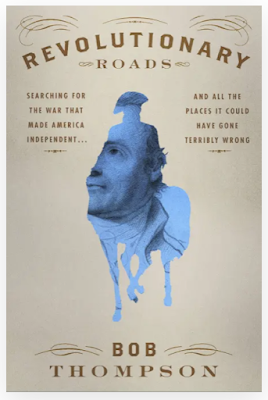Revolutionary Roads: Searching for the War That Made America Independent...and All the Places It Could Have Gone Terribly Wrong
By Bob Thompson
Twelve; hardcover, 448 pages; $32; available today, Tuesday, February 7th
Bob Thompson is the author of Born on a Mountaintop, an on-the-road exploration of the real and legendary Davy Crockett. As a longtime feature writer for the Washington Post and the editor of its Sunday magazine, he was known for his articles on the intersection of history and myth.
In his new book Revolutionary Roads, Thompson takes the same template to track where the pivotal figures and key turning points of the American Revolutionary War occurred in the eastern United States.
This is a time-traveling adventure through the crucial places American independence was won and might have been lost. Thompson puts more than 20,000 miles on his car, walks history-shaping battlefields from Georgia to Quebec, and meets with people who love revolutionary history, and whose vivid storytelling and deep knowledge enrich his own.
Thompson puts all these elements together into a compelling and entertaining work, told in the ride-along tradition of Sarah Vowell, Tony Horwitz, and Bill Bryson, that tells the story of the American Revolution in an entirely new way.
The interesting thing for New Yorkers reading this, who may not be aware of it, is that a lot of the Revolutionary War happened right here in Brooklyn, including at the site of what is now Fort Hamilton in Bay Ridge, and across New York Harbor, at Fort Wadsworth on Staten Island, and in Manhattan.
Thompson writes of his journey in this excerpt: "The Revolutionary War is one of the greatest stories in all history, an eight-year epic replete with self-sacrificing heroes, self-interested villains, and, more interesting, all the shades of complex humanity in between. It boasts large-scale gambles that sometimes paid off but usually didn't (whose idea was it to invade Canada through the Maine wilderness?) as well as countless moments like the 'something different' that will disrupt Morgan's plan at Cowpens - tiny, fraught tipping points which, had events played out in other ways, could have altered the course of the war. The drama is magnified when you consider what was at stake: not just the future of thirteen colonies complaining of long-distance tyranny, but the fate of a social and political experiment that would transform the world.
Yet we don't know the story as well as we should - or how easily the ending could have changed.
We remember the midnight ride of Paul Revere, but we don't know who fired the first shot in Lexington, or why the famous fight at Concord's Old North Bridge almost didn't occur. We recall that George Washington crossed the Delaware to win an essential victory at Trenton, but not how close he came to having his army wiped out eight days later. We know there was a cruel winter at Valley Forge and a climactic British surrender at Yorktown, but we're weak on context and details. (See "the Capes, Battle of," one of many prerequisites for that surrender.) We admire the idealism of the Marquis de Lafayette, but we would be hard pressed - or at least I was, before I started reading up on him - to say what the teenage French volunteer did during the war.
Hint: On-the-job training can be scary at times.
We don't know nearly enough about the months-long catastrophe that was George Washington's attempt to defend New York City in 1776. Fought on what would become some of America's most expensive real estate - Brooklyn Heights! Midtown! The Upper West Side! - the New York campaign added up to a series of humiliating defeats or miraculous escapes, depending on who's telling the tale. On the night of August 29, to take just one example, Washington and his badly beaten army were ferried across the East River from Brooklyn to Manhattan by a bunch of sailors and fishermen from Massachusetts. Great skill and fortitude were involved. But if the wind had changed a day earlier, nine thousand men would have been captured and the war could have been over.
We know little about what Benedict Arnold did before turning his name into a synonym for Traitorous Scumbag - but we should. Among other things, his fingerprints are all over the Saratoga campaign, widely viewed as the turning point of the Revolution because its triumphant conclusion helped bring the French into the war. How much credit does the ferociously combative Arnold, not known for playing well with others, deserve for Saratoga? Historians are still duking this one out; it's fun to watch.
African Americans, free and enslaved, worked and fought for both sides during the Revolution (though more sided with the British, who started liberating those enslaved to rebels early on). Americans today are at least beginning to be aware of this story. Yet few understand how slavery's end might have been accelerated if we had recruited enslaved men to fight in return for their freedom - as Rhode Island did, briefly - or how such a plan came to be fiercely debated in South Carolina. That plan's idealistic young author, John Laurens, would remain obscure, at least until he made his Broadway debut as a sidekick in Hamilton."
Virtual Author Event: Bob Thompson will be in conversation with Glenn Frankel on February 20th at 7:00 P.M. eastern time - Politics & Prose Bookstore/YouTube Livestream - click here for more information and to view it on the 20th.

No comments:
Post a Comment